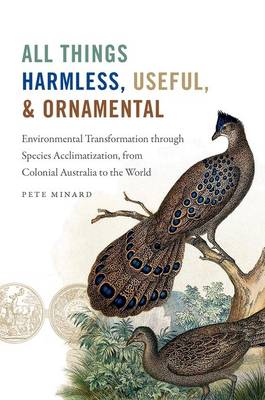
- Afhalen na 1 uur in een winkel met voorraad
- Gratis thuislevering in België vanaf € 30
- Ruim aanbod met 7 miljoen producten
- Afhalen na 1 uur in een winkel met voorraad
- Gratis thuislevering in België vanaf € 30
- Ruim aanbod met 7 miljoen producten
Zoeken
All Things Harmless, Useful, and Ornamental
Environmental Transformation Through Species Acclimatization, from Colonial Australia to the World
Pete Minard
€ 57,45
+ 114 punten
Uitvoering
Omschrijving
Species acclimatization -- the organized introduction of organisms to a new region -- is much maligned in the present day. However, colonization depended on moving people, plants, and animals from place to place, and in centuries past, scientists, landowners, and philanthropists formed acclimatization societies to study local species and conditions, form networks of supporters, and exchange supposedly useful local and exotic organisms across the globe.
Pete Minard tells the story of this movement, arguing that the colonies, not the imperial centers, led the movement for species acclimatization. Far from attempting to re-create London or Paris, settlers sought to combine plants and animals to correct earlier environmental damage and to populate forests, farms, and streams to make them healthier and more productive. By focusing particularly on the Australian colony of Victoria, Minard reveals a global network of would-be acclimatizers, from Britain and France to Russia and the United States. Although the movement was short-lived, the long reach of nineteenth-century acclimatization societies continues to be felt today, from choked waterways to the uncontrollable expansion of European pests in former colonies.
Pete Minard tells the story of this movement, arguing that the colonies, not the imperial centers, led the movement for species acclimatization. Far from attempting to re-create London or Paris, settlers sought to combine plants and animals to correct earlier environmental damage and to populate forests, farms, and streams to make them healthier and more productive. By focusing particularly on the Australian colony of Victoria, Minard reveals a global network of would-be acclimatizers, from Britain and France to Russia and the United States. Although the movement was short-lived, the long reach of nineteenth-century acclimatization societies continues to be felt today, from choked waterways to the uncontrollable expansion of European pests in former colonies.
Specificaties
Betrokkenen
- Auteur(s):
- Uitgeverij:
Inhoud
- Aantal bladzijden:
- 208
- Taal:
- Engels
- Reeks:
Eigenschappen
- Productcode (EAN):
- 9781469651613
- Verschijningsdatum:
- 17/06/2019
- Uitvoering:
- Paperback
- Formaat:
- Trade paperback (VS)
- Afmetingen:
- 156 mm x 234 mm
- Gewicht:
- 331 g

Alleen bij Standaard Boekhandel
+ 114 punten op je klantenkaart van Standaard Boekhandel
Beoordelingen
We publiceren alleen reviews die voldoen aan de voorwaarden voor reviews. Bekijk onze voorwaarden voor reviews.








